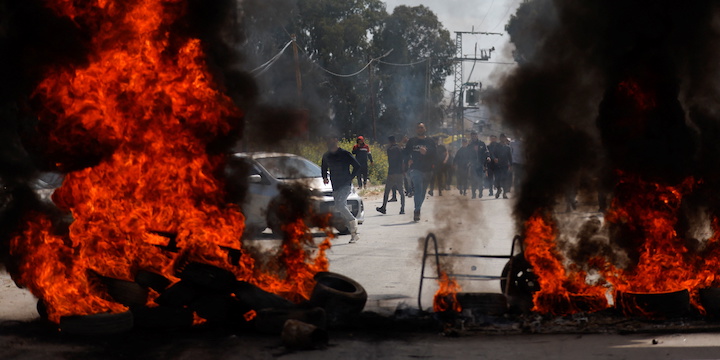Media Reality Check: Jenin Is the Epicenter of Palestinian Terrorism
 by Rachel O'Donoghue
by Rachel O'Donoghue

Palestinians run near burning tires during clashes with Israeli forces following a raid, in Jenin in the West Bank April 9, 2022. Photo: REUTERS/Mohamad Torokman
The Washington Post reported on May 16th about how a leading Catholic clergyman in Israel had condemned the events surrounding the funeral of Al Jazeera journalist Shireen Abu Akleh, who was shot and killed during a terrorism raid in the West Bank.
What went unmentioned in the entire piece is that Abu Akleh’s tragic death occurred in a terror hotbed, a place where most of the Palestinians who have carried out the recent terror attacks on Jewish civilians have come from.
Instead, The Washington Post has chosen to rebrand the city of Jenin as a mere “refugee camp.”
The Post piece covers the disagreements surrounding the exact circumstances of Abu Akleh’s death, by stating:
Israel and the Palestinians are locked in a war of narratives over Abu Akleh’s killing. The reporter, a Palestinian-American, a Catholic and a 25-year veteran of the satellite channel, was shot Wednesday while covering an Israeli military raid in the Jenin refugee camp. She was wearing a blue vest clearly marked “Press.” Abu Akleh was a household name across the Arab world, known for documenting the hardship of Palestinian life under Israeli rule. [Emphasis added]
The above reference to the “raid on the Jenin refugee camp” immediately followed by the description of Abu Akleh’s work focused on “documenting the hardship of Palestinian life under Israeli rule” is problematic for several reasons.
First, Jenin is not simply one big Palestinian refugee camp that Israeli authorities flagrantly invaded. Rather, the area around the city, including the UNRWA-run camp, has long been a hub for terrorist activities, and is known as a stronghold for the Gaza-based terror group, Palestinian Islamic Jihad (PIJ).
Indeed, the perpetrators of multiple terror attacks in the last two months in Israel have been residents of Jenin or surrounding villages, including the Palestinian terrorist who murdered three people in a Tel Aviv bar on April 7, and the ISIS-inspired gunman who slaughtered five in Bnei Brak.
Second, the absence of any reference in the article to the terror wave that prompted the raid in Jenin is a troubling omission: it makes it possible for the IDF’s incursion into Jenin to be interpreted as entirely unwarranted, and suggests that the raid was launched only in order to victimize the camp’s residents.
The unfortunate fact is that such military expeditions into Palestinian towns and villages in the West Bank are a necessity, in order to capture those who have committed terrorist acts, or to apprehend individuals suspected of planning future attacks.
Finally, the segue into the description of Abu Akleh’s work as dedicated to revealing the “hardship” Palestinians endure “under Israeli rule,” hints at the debunked Israel as a colonialist entity myth.
In fact, Jenin is administered by the Palestinian Authority — as agreed under the Oslo Accords. As noted, the entry of Israeli soldiers into the area is only for security purposes and is generally coordinated with Palestinian forces.
The above points may seem minor, a mere matter of semantics. However, they are of vital importance when we consider how many people around the world rely on The Washington Post and other prominent publications to gain a better understanding of the events surrounding Abu Akleh’s death and wider Israeli-Palestinian issues.
So why did The Washington Post and other outlets choose to bury such crucial information?
 Palestinian Prime Minister Announces New Reform Package
Palestinian Prime Minister Announces New Reform Package France: Man Suspected of Abducting, Raping Jewish Woman ‘to Avenge Palestine’
France: Man Suspected of Abducting, Raping Jewish Woman ‘to Avenge Palestine’ Israel Intensifies Strikes Across Gaza, Orders New Evacuations in North
Israel Intensifies Strikes Across Gaza, Orders New Evacuations in North Iran Threatens to Annihilate Israel Should It Launch a Major Attack
Iran Threatens to Annihilate Israel Should It Launch a Major Attack ‘Completely Baseless’: Reports of Mass Graves at Gaza Hospitals are False, IDF Says
‘Completely Baseless’: Reports of Mass Graves at Gaza Hospitals are False, IDF Says Columbia University Shutters Campus as Jews Fear for Safety, Critics Call for President to Resign
Columbia University Shutters Campus as Jews Fear for Safety, Critics Call for President to Resign ‘Hamas, We Love You!’ A List of the Chants, Statements From Columbia University’s ‘Gaza Solidarity Encampment’
‘Hamas, We Love You!’ A List of the Chants, Statements From Columbia University’s ‘Gaza Solidarity Encampment’ ‘Useless Pigs’: Anti-Israel Demonstrations Rage at Yale University, Forcing Police Intervention
‘Useless Pigs’: Anti-Israel Demonstrations Rage at Yale University, Forcing Police Intervention Anti-Israel Protesters Interrupt Chelsea Handler Comedy Show Because of Her Support for Jewish State
Anti-Israel Protesters Interrupt Chelsea Handler Comedy Show Because of Her Support for Jewish State Israeli Hostage Families Make Passover Plea for Return of Missing Loved Ones
Israeli Hostage Families Make Passover Plea for Return of Missing Loved Ones



 ‘Hamas, We Love You!’ A List of the Chants, Statements From Columbia University’s ‘Gaza Solidarity Encampment’
‘Hamas, We Love You!’ A List of the Chants, Statements From Columbia University’s ‘Gaza Solidarity Encampment’ Columbia University Shutters Campus as Jews Fear for Safety, Critics Call for President to Resign
Columbia University Shutters Campus as Jews Fear for Safety, Critics Call for President to Resign ‘Completely Baseless’: Reports of Mass Graves at Gaza Hospitals are False, IDF Says
‘Completely Baseless’: Reports of Mass Graves at Gaza Hospitals are False, IDF Says Iran Threatens to Annihilate Israel Should It Launch a Major Attack
Iran Threatens to Annihilate Israel Should It Launch a Major Attack Israel Intensifies Strikes Across Gaza, Orders New Evacuations in North
Israel Intensifies Strikes Across Gaza, Orders New Evacuations in North